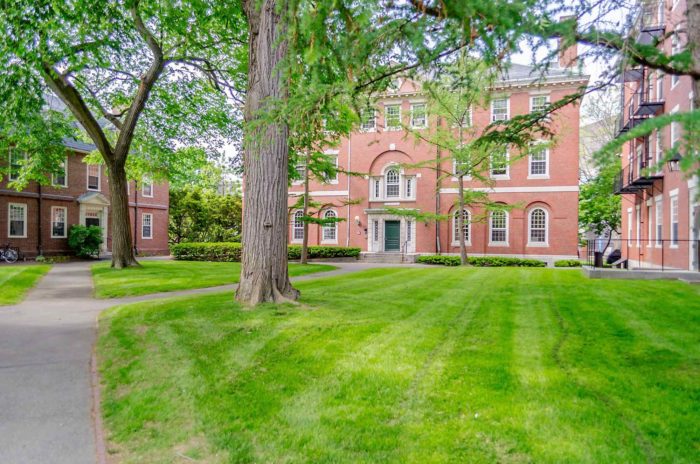
UPDATE: Oct. 7, 2020, legal action from students seeking a full refund of their Harvard tuition after a coronavirus-prompted transition to remote classes should be dismissed, according to a motion filed in the class action lawsuit.
A college student has filed a class action against Harvard, claiming she is being deprived of the Ivy League experience for which she paid thousands of dollars.
The unnamed student, a North Carolina resident, says she paid Harvard University tuition and fees for the spring semester. In return, she expected the full “opportunity for collaborative learning and in-person dialogue, feedback, and critique” for which that institution is renowned.
However, no in-person classes have been held at Harvard since March 13 because of coronavirus precautions. All classes are now being conducted online, and that is expected to continue at least through the end of the spring semester.
In addition, no on-campus facilities or services have been available to college students during this time. That includes its vaunted libraries, museums, laboratories and research centers, as well as Harvard’s numerous sporting and cultural activities.
“As a result of the closure of Defendant’s facilities, Defendant has not delivered the educational services, facilities, access and/or opportunities that Student A and the putative class contracted and paid for,” the Harvard University tuition class action lawsuit argues.
“The online learning options being offered to Harvard students are subpar in practically every aspect, from the lack of facilities, materials, and access to faculty. … The remote learning options are in no way the equivalent of the in-person education that Plaintiff and the putative class members contracted and paid for.”
If you paid to attend any private college or university that closed its campus because of the coronavirus, but you received no refund, click here to participate in an investigation.
The filing reports that Harvard University tuition for undergraduates is nearly $24,000 per semester, with fees for health, services and activities adding to the total. Harvard’s graduate business and law school students pay many thousands more.
“The tuition and fees for in-person instruction at Harvard are higher than tuition and fees for its other online courses/programs because such costs cover not just the academic instruction, but encompass an entirely different experience, which includes but is not limited to: face to face interaction with professors, mentors, and peers; access to facilities such as libraries, laboratories, computer labs, and study room; student governance and student unions; extra-curricular activities, groups, intramural sports, etc.; student art, cultures, and other activities; social development and independence; hands on learning and experimentation; and networking and mentorship opportunities,” the Harvard University tuition class action lawsuit claims.
The university’s own marketing materials tout the big picture: “The Harvard student experience is characterized by unlimited possibilities. Opportunities abound inside the classroom and out. … Here, undergraduate students have access to almost every extracurricular program imaginable and the largest Division 1 athletic program in the country.”

“The remote education being provided is not even remotely worth the amount charged class members for Spring Semester 2020 tuition,” she maintains in the Harvard University tuition lawsuit. “Plaintiff and members of the class did not choose to attend an online institution of higher learning, but instead chose to attend [Harvard] and enroll on an in-person basis.”
It does not matter that institutions all over the nation have been forced to close their campuses because of the COVID-19 pandemic, the plaintiff argues; tuition and fees still should be returned because it did not uphold its end of the contract.
“Even if Defendant did not have a choice in canceling in-person classes, it nevertheless has improperly retained funds for services it is not providing.”
Plaintiff is claiming breach of contract, unjust enrichment and conversion. She is seeking a partial refund of Harvard University tuition and fees for herself and other college students in her situation, “proportionate to the amount of time that remained in the Spring Semester 2020 when classes moved online and campus services ceased being provided.”
In addition, through a jury trial, she is looking for compensatory and punitive damages plus court costs.
The plaintiff is simply called Student A in the lawsuit “due to a reasonable fear of retaliation and harassment from Harvard and its supporters, for proceeding with this claim.”
U.S. students aren’t the only ones facing a decreased quality of education in the wake of the coronavirus pandemic, students in the U.K. are also discouraged by the move to online classes.
She and other college students in the proposed Class are represented by David Pastor of Pastor Law Office LLP and Frederick J. Klorczyk III and Alec M. Leslie, both of Bursor & Fisher PA.
The Harvard University Tuition Class Action Lawsuit is Student A, et al. v. Harvard University, Case No. 1:20-cv-10968, in the U.S. District Court for the District of Massachusetts.
ATTORNEY ADVERTISING
Top Class Actions is a Proud Member of the American Bar Association
LEGAL INFORMATION IS NOT LEGAL ADVICE
Top Class Actions Legal Statement
©2008 – 2026 Top Class Actions® LLC
Various Trademarks held by their respective owners
This website is not intended for viewing or usage by European Union citizens.














